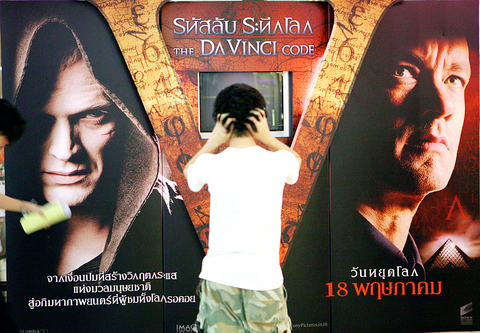Christian leaders in Asia fear the debut today of the movie The Da Vinci Code, based on the premise that Jesus married and fathered children, may sour the image of their religion in the region, where Christianity is overshadowed by Buddhism, Hinduism and Islam.
Christians in India, Malaysia, the Philippines, Singapore, South Korea and Thailand have either protested against the film or expressed concern.
India is temporarily putting the film's release on hold after a flood of complaints. Groups in Thailand persuaded local censors to release an edited version of the film, but the censors later reversed their position. Australian Christians have gone on the offensive, launching ads that challenge the movie's plot in movie theaters. Hong Kong's Catholic church has organized forums to "clarify the facts."

PHOTO: AFP
Christians around the world have criticized The Da Vinci Code, the largely faithful adaptation of the best-selling novel by the same name by Dan Brown.
One of the premises of the movie is that Jesus Christ married Mary Magdalene and fathered children and that his descendants are still alive.
It's considered blasphemy by many Christians, but those in Asia are especially worried, fearful that the movie may spread misinformation about their religion, which is a minority faith in many countries in the region.
"If Jesus Christ had a child and a wife, then Christianity would be destroyed," said Thongchai Pradabchananurat, of the Thailand Protestant Churches Coordinating Committee.
After lobbying by Christian groups, Thailand's censorship board agreed to snip the last 10 minutes of the film, but the movie's maker, Columbia Pictures, appealed successfully yesterday.
In India, Joseph Dias, head of the Catholic Secular Forum, is on a hunger strike in downtown Bombay to protest the movie's planned release in his country, where most of the 1 billion population is Hindu.
After receiving more than 200 complaints, India's Information and Broadcasting Minister Priya Ranjan Dasmunshi said he is going to see the movie for himself, which may delay its scheduled release in the country tomorrow by a day or two.
Authorities in India, Singapore and South Korea have rejected calls to ban the film, saying audiences understand it is fictional.
Philippine movie censor Marissa Laguardia said it was important to preserve free speech in her country.
"Thirty-six countries have already reviewed this film and they have not banned it. So are we just out of the Stone Age?" Laguardia said.
Malaysian Bishop Lim Cheng Ean said the strength of Christian faith alone will counter the movie.
Meanwhile, critics at the Cannes film festival panned the film yesterday, describing it variously as a "dud," "unwieldy" and "plodding."

Taiwan is projected to lose a working-age population of about 6.67 million people in two waves of retirement in the coming years, as the nation confronts accelerating demographic decline and a shortage of younger workers to take their place, the Ministry of the Interior said. Taiwan experienced its largest baby boom between 1958 and 1966, when the population grew by 3.78 million, followed by a second surge of 2.89 million between 1976 and 1982, ministry data showed. In 2023, the first of those baby boom generations — those born in the late 1950s and early 1960s — began to enter retirement, triggering

ECONOMIC BOOST: Should the more than 23 million people eligible for the NT$10,000 handouts spend them the same way as in 2023, GDP could rise 0.5 percent, an official said Universal cash handouts of NT$10,000 (US$330) are to be disbursed late next month at the earliest — including to permanent residents and foreign residents married to Taiwanese — pending legislative approval, the Ministry of Finance said yesterday. The Executive Yuan yesterday approved the Special Act for Strengthening Economic, Social and National Security Resilience in Response to International Circumstances (因應國際情勢強化經濟社會及民生國安韌性特別條例). The NT$550 billion special budget includes NT$236 billion for the cash handouts, plus an additional NT$20 billion set aside as reserve funds, expected to be used to support industries. Handouts might begin one month after the bill is promulgated and would be completed within

NO CHANGE: The TRA makes clear that the US does not consider the status of Taiwan to have been determined by WWII-era documents, a former AIT deputy director said The American Institute in Taiwan’s (AIT) comments that World War-II era documents do not determine Taiwan’s political status accurately conveyed the US’ stance, the US Department of State said. An AIT spokesperson on Saturday said that a Chinese official mischaracterized World War II-era documents as stating that Taiwan was ceded to the China. The remarks from the US’ de facto embassy in Taiwan drew criticism from the Ma Ying-jeou Foundation, whose director said the comments put Taiwan in danger. The Chinese-language United Daily News yesterday reported that a US State Department spokesperson confirmed the AIT’s position. They added that the US would continue to

IMPORTANT BACKER: China seeks to expel US influence from the Indo-Pacific region and supplant Washington as the global leader, MAC Minister Chiu Chui-cheng said China is preparing for war to seize Taiwan, Mainland Affairs Council (MAC) Minister Chiu Chui-cheng (邱垂正) said in Washington on Friday, warning that Taiwan’s fall would trigger a regional “domino effect” endangering US security. In a speech titled “Maintaining the Peaceful and Stable Status Quo Across the Taiwan Strait is in Line with the Shared Interests of Taiwan and the United States,” Chiu said Taiwan’s strategic importance is “closely tied” to US interests. Geopolitically, Taiwan sits in a “core position” in the first island chain — an arc stretching from Japan, through Taiwan and the Philippines, to Borneo, which is shared by